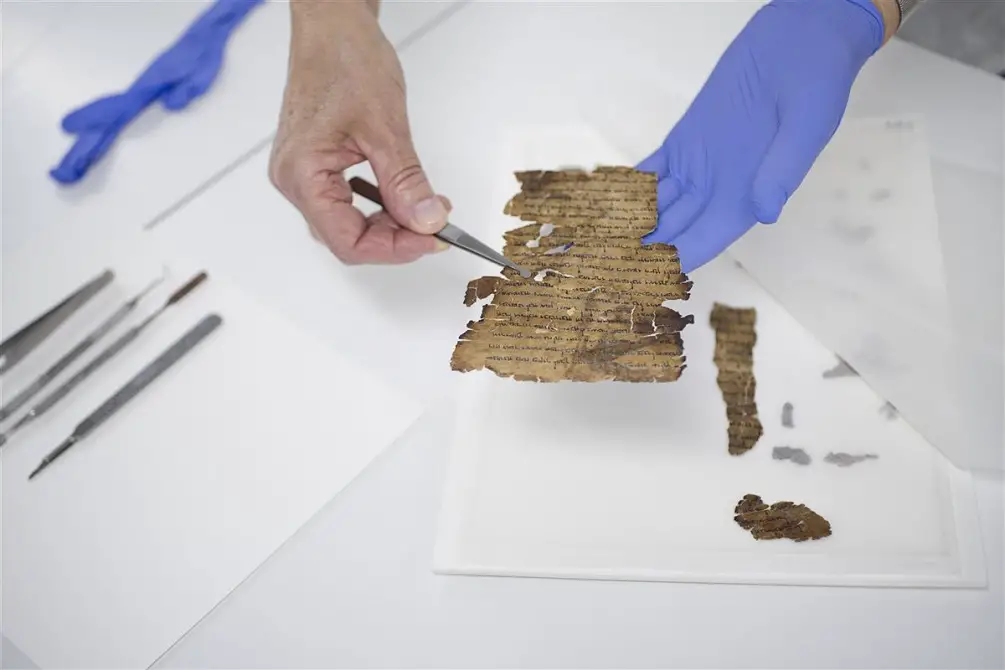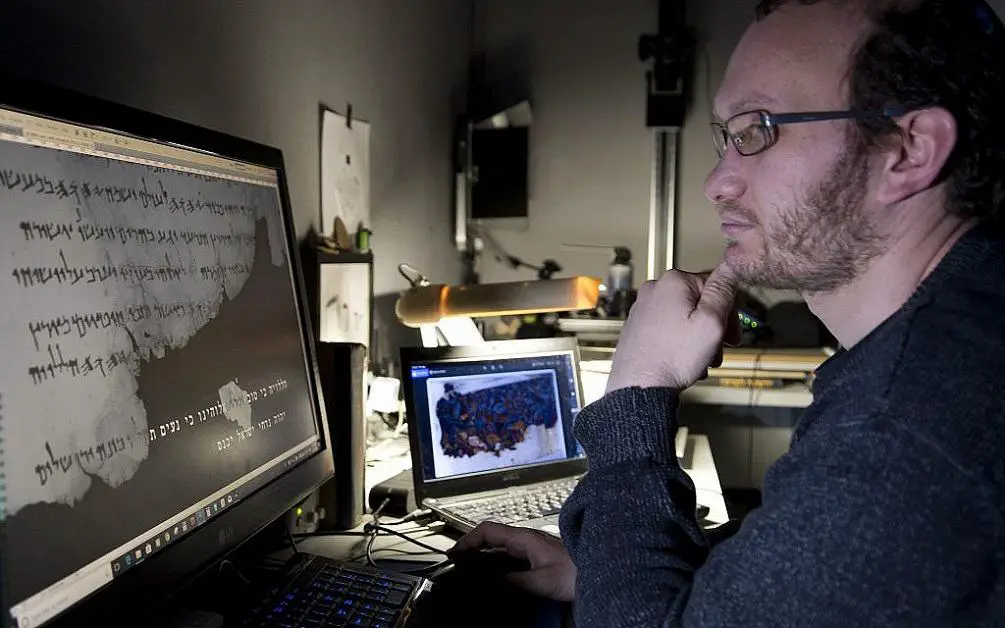NASA Technology Helps Reveal Hidden Texts On Dead Sea Scrolls In Stunning Discovery

By
Ivan
Who says that NASA only makes fantastic discoveries in space?
Using a specialized camera initially developed by NASA, researchers in Israel made a stunning discovery while analyzing texts on the famous Dead Sea Scrolls.
According to an announcement by the Israel Antiquities Authority (IAA), experts have uncovered previously hidden text on the Dead Sea Scrolls, raising many questions whether there are more ancient manuscripts featuring writings invisible to the naked eye.
After analyzing the ancient manuscripts with infrared using a multispectral imaging camera, experts from Israel have revealed that dozens of ancient scroll fragments, previously thought to be blank, actually contain traces of ink.

The Dead Sea Scrolls fragments, which are believed to be around 2,000 years old are extremely fragile. Image Credit: Shai Halevi Israel Antiquities Authority
The Dead Sea Scrolls are a massive historical collection featuring more than 900 religious manuscripts, as well as miniature text fragments recovered in a cave system (Qumran Caves) near the shores of the Dead Sea, near the ancient settlement of Khirbet Qumran.
Oren Ableman, a researcher on the manuscripts of the Israel Antiquities Authority (IAA) and a Ph.D. student at the Hebrew University of Jerusalem, discovered the new writing while examining a dozen fragments of finding in the Qumran Caves, revealed the Israel Antiquities Authority.
The detailed study, conducted by Ableman has allowed deciphering the writing of many of the fragments and even knowing which manuscripts probably belong to some of the new fragments.

Oren Ableman, a scroll researcher at the Dead Sea Scrolls unit of the Israel Antiquities Authority, examining the ink traces that have been discovered. Image Credit: Shai Halevi, The Leon Levy Dead Sea Scrolls Digital Library.
“I do feel honored to be part of it. Sometimes I feel like, I’m just a Ph.D. student, and I’m finding these discoveries,” said Abelman. “It’s exciting.”
The discovery was presented at a conference in Israel called “The Dead Sea Scrolls at Seventy: Clear a Path in the Wilderness.”
“As part of the project each of the thousands of fragments of the Dead Sea Scrolls is imaged to monitor its physical condition and make the best possible images available to the public,” the organization wrote in a statement.
https://youtu.be/UoSacC4gxao
As noted in the statement, the discovery made by experts features fragments from the books of Deuteronomy, Leviticus, Jubilees (also known as the Lesser Genesis), and The Temple Scroll, which is the longest of all the Dead Sea Scrolls found to date. These ancient manuscripts have been dated to range from the 3rd century BC to the 1st century CE.
The hidden writings reveal a script that belongs to a third copy of the temple scroll, an ancient text where God explains to Moses how a temple should be erected, and how services within the temple should be performed.
Until now, experts were only aware of the existence of two Temple Scrolls, but the discovery adds another one to the collection.
Also, researchers have identified a fragment belonging to the Scroll of the Great Psalms (11Q5); retaining a part of the beginning of Psalm 147: 1.
And, finally, another fragment contains letters written in an ancient Hebrew script (paleo-Hebrew alphabet).
This fragment could not be attributed to any of the known manuscripts, so it is possible that it belonged to a still, hitherto unknown manuscript.
According to Head of the Israel Antiquities Authority’s Dead Sea Scrolls Lab Pnina Shor, “Multispectral imaging lets us read what is invisible to the eye.”
“Every image is an act of preservation,” said Shor. “If God forbid, something happens to the scroll; we still have 100% accurately reliable images.”
Source: The Times Of Israel
Featured Image Credit: The Great Psalms Scroll (11Q5) together with the new fragment containing Psalm 147:1. Shai Halevi, The Leon Levy Dead Sea Scrolls Digital Library.
Thanks to Ivan at: https://ancient-code.com

By
Ivan
Who says that NASA only makes fantastic discoveries in space?
Using a specialized camera initially developed by NASA, researchers in Israel made a stunning discovery while analyzing texts on the famous Dead Sea Scrolls.
According to an announcement by the Israel Antiquities Authority (IAA), experts have uncovered previously hidden text on the Dead Sea Scrolls, raising many questions whether there are more ancient manuscripts featuring writings invisible to the naked eye.
After analyzing the ancient manuscripts with infrared using a multispectral imaging camera, experts from Israel have revealed that dozens of ancient scroll fragments, previously thought to be blank, actually contain traces of ink.

The Dead Sea Scrolls fragments, which are believed to be around 2,000 years old are extremely fragile. Image Credit: Shai Halevi Israel Antiquities Authority
The Dead Sea Scrolls are a massive historical collection featuring more than 900 religious manuscripts, as well as miniature text fragments recovered in a cave system (Qumran Caves) near the shores of the Dead Sea, near the ancient settlement of Khirbet Qumran.
Oren Ableman, a researcher on the manuscripts of the Israel Antiquities Authority (IAA) and a Ph.D. student at the Hebrew University of Jerusalem, discovered the new writing while examining a dozen fragments of finding in the Qumran Caves, revealed the Israel Antiquities Authority.
The detailed study, conducted by Ableman has allowed deciphering the writing of many of the fragments and even knowing which manuscripts probably belong to some of the new fragments.

Oren Ableman, a scroll researcher at the Dead Sea Scrolls unit of the Israel Antiquities Authority, examining the ink traces that have been discovered. Image Credit: Shai Halevi, The Leon Levy Dead Sea Scrolls Digital Library.
“I do feel honored to be part of it. Sometimes I feel like, I’m just a Ph.D. student, and I’m finding these discoveries,” said Abelman. “It’s exciting.”
The discovery was presented at a conference in Israel called “The Dead Sea Scrolls at Seventy: Clear a Path in the Wilderness.”
“As part of the project each of the thousands of fragments of the Dead Sea Scrolls is imaged to monitor its physical condition and make the best possible images available to the public,” the organization wrote in a statement.
https://youtu.be/UoSacC4gxao
As noted in the statement, the discovery made by experts features fragments from the books of Deuteronomy, Leviticus, Jubilees (also known as the Lesser Genesis), and The Temple Scroll, which is the longest of all the Dead Sea Scrolls found to date. These ancient manuscripts have been dated to range from the 3rd century BC to the 1st century CE.
The hidden writings reveal a script that belongs to a third copy of the temple scroll, an ancient text where God explains to Moses how a temple should be erected, and how services within the temple should be performed.
Until now, experts were only aware of the existence of two Temple Scrolls, but the discovery adds another one to the collection.
Also, researchers have identified a fragment belonging to the Scroll of the Great Psalms (11Q5); retaining a part of the beginning of Psalm 147: 1.
And, finally, another fragment contains letters written in an ancient Hebrew script (paleo-Hebrew alphabet).
This fragment could not be attributed to any of the known manuscripts, so it is possible that it belonged to a still, hitherto unknown manuscript.
According to Head of the Israel Antiquities Authority’s Dead Sea Scrolls Lab Pnina Shor, “Multispectral imaging lets us read what is invisible to the eye.”
“Every image is an act of preservation,” said Shor. “If God forbid, something happens to the scroll; we still have 100% accurately reliable images.”
Source: The Times Of Israel
Featured Image Credit: The Great Psalms Scroll (11Q5) together with the new fragment containing Psalm 147:1. Shai Halevi, The Leon Levy Dead Sea Scrolls Digital Library.
Thanks to Ivan at: https://ancient-code.com






 Sat Mar 23, 2024 11:33 pm by globalturbo
Sat Mar 23, 2024 11:33 pm by globalturbo

